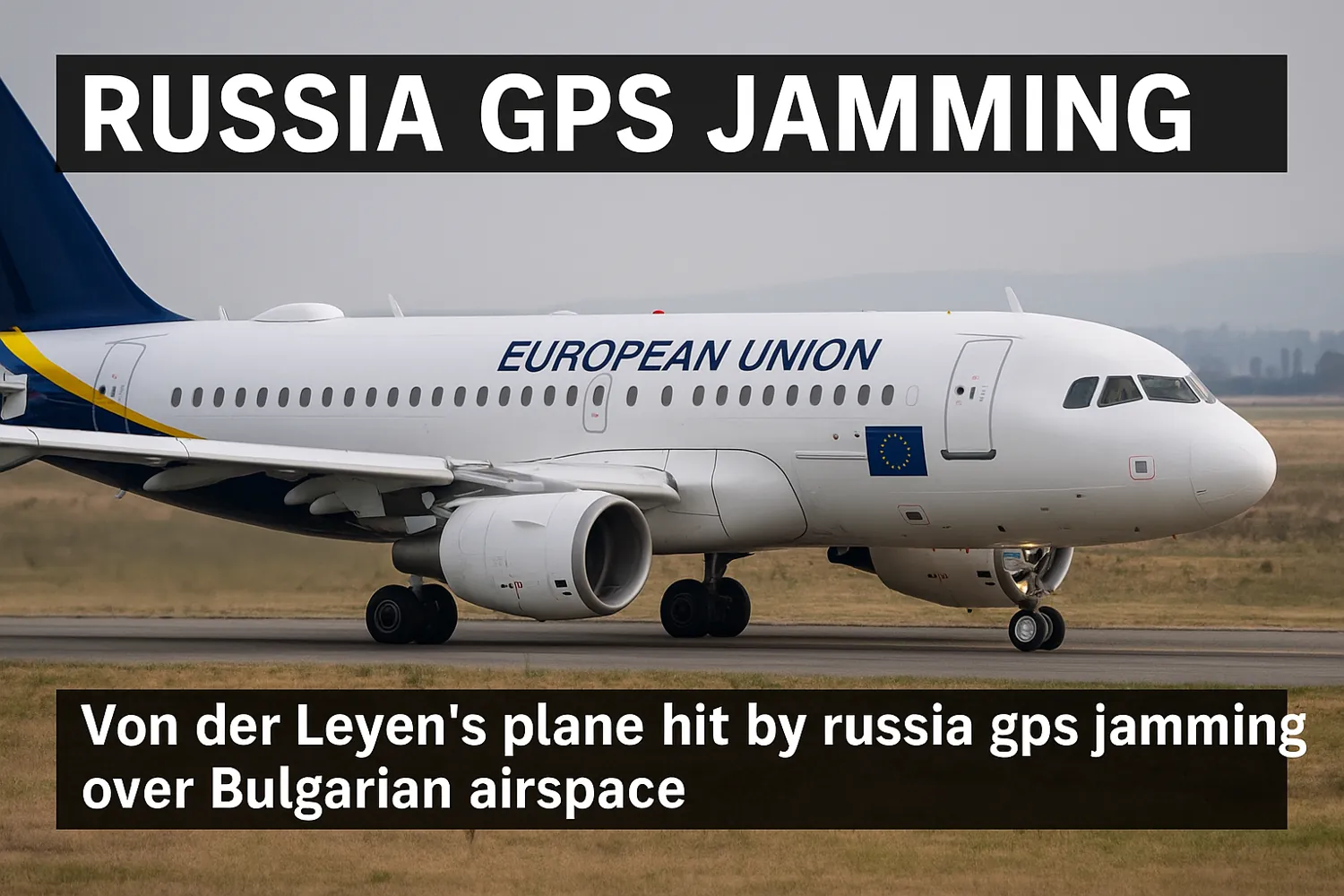When GPS fails mid-air, and everyone pretends it’s normal
Russia GPS jamming isn’t new. But this time, it struck a plane carrying the head of the European Commission — and that should’ve triggered an international storm. Instead, there was silence, then deflection, then distraction.
On August 31, Ursula von der Leyen’s government aircraft briefly lost navigation over Bulgarian airspace. Officially, it was chalked up to “interference.” Unofficially, intelligence reports suggest deliberate GPS jamming, suspected to originate from Russian systems operating near the Black Sea.
This was not a technical glitch. It was a geopolitical warning shot.
Context: The incident and its details
According to Bulgarian aviation authorities, Von der Leyen’s Falcon 7X encountered GPS signal loss for nearly four minutes over the country’s southeast — a known jamming hotspot.
Key facts:
- Flight crew switched to manual backup navigation
- No casualties or critical systems failed
- Signal interference tracked to southern vector consistent with Russian Black Sea deployments
- Bulgaria issued a “technical anomaly” notice but not a diplomatic protest
This isn’t the first incident:
- NATO aircraft near Kaliningrad regularly experience jamming
- Commercial flights over eastern Poland and Romania have reported false GPS data
- Finland and Norway documented similar cases over the Arctic in 2023
But this time, the passenger was not anonymous. She’s the head of the EU executive branch. And that makes the non-response more alarming than the act itself.
Oppositional Argument: This is hybrid warfare — and Europe still sleeps
Let’s stop calling this “interference.” Russia GPS jamming is electronic aggression. It’s not just about confusing pilots. It’s about probing weaknesses, testing boundaries, and humiliating institutions.
What if:
- It was a medical evacuation flight?
- It was a military transport on NATO business?
- It had crashed?
We call cyberattacks warfare. Why is GPS jamming — which endangers lives — still treated like an annoying prank?
Because once again, Europe prioritizes not escalating over defending sovereignty.
Analytical Breakdown: Why GPS is the next battlefield
Russia’s capabilities and motivations
Russia’s military invests heavily in electronic warfare (EW), particularly via:
- Murmansk-BN and Krasukha-4 jamming systems
- R-330Zh mobile units stationed near Crimea
- Ship-based jammers deployed with Black Sea Fleet
These systems can disrupt:
- Navigation for aircraft and drones
- Guided missiles
- Civil aviation safety protocols
And because GPS jamming is hard to attribute definitively — Russia uses it as the perfect grey-zone weapon.
The vulnerability of EU skies
Despite the EU’s technological prestige, its aviation is critically dependent on:
- U.S.-owned GPS
- Outdated ground-based radio navigation
- Lax airspace conflict protocols
Only a few EU countries — Sweden, France, Finland — have invested in GNSS resilience systems. The rest still operate on trust and outdated contingency plans.
Legal grey areas
Under ICAO rules, deliberate signal disruption is a violation of airspace safety — but unless someone admits responsibility, there’s no mechanism for enforcement.
That’s the genius of jamming. It denies accountability while asserting power.
Human Perspective: Pilots, passengers, and air traffic stress
Aviation insiders reveal what really happens during GPS failure:
- Pilots lose situational awareness, especially at night or over sea
- Air traffic controllers scramble to reroute planes
- Passengers are never told, but delayed landings and erratic flight paths follow
One pilot told a European outlet, “We’re told to treat it as routine. But losing your position at 40,000 feet isn’t routine. It’s terrifying.”
Imagine sitting on that plane, unaware that hostile actors are playing games with your trajectory.
Counterarguments
“There’s no hard proof it was Russia.”
No public attribution doesn’t mean no internal certainty. Military tracking systems can pinpoint source vectors with high confidence.
“It didn’t cause an accident.”
Yet. But safety culture exists precisely to prevent the first fatal incident.
“Responding risks escalation.”
So does silence. And Russia’s strategy thrives on silence.
Conclusion: Denial is not deterrence
Russia GPS jamming is not isolated mischief. It’s doctrine. It’s policy. And it’s escalating.
The Von der Leyen incident was not an accident. It was a test — and Europe failed it. Again.
If the EU cannot protect the aircraft of its own top official, what credibility does it have in securing its skies, let alone defending its borders?
This is not the time for more white papers and cautious language. It’s time for:
- Clear attribution
- Diplomatic pressure
- EW countermeasures
- A GPS sovereignty strategy
Because if Europe waits until a plane crashes, it will have waited too long.
External Links
- Fox News: Russia suspected of GPS jamming on EU leader’s flight
- Sky News: GPS blackout disrupts Von der Leyen’s route
